Military
Helicopters
MH-53J
Pave Low HH-60
Pave Hawk SH-60 Seahawk
AH-1W
Super Cobra
AH-64D
Apache UH-60
Blackhawk CH-53E Super Stallion
Chinook (CH-47 & MH-47)
UH-1C
V-22
Osprey
return
|
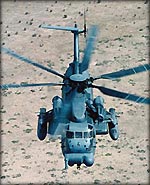
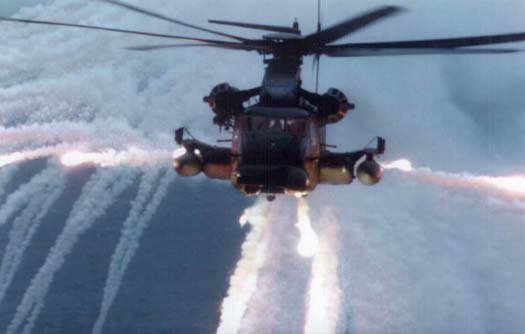
The
Pave Low is a powerful special operations chopper operated by the U.S.
Air Force, mainly for transporting special operations forces. It can
carry two 7.62mm miniguns along with a .50-caliber machine gun.
|
MH-53J
Pave Low III
Primary function: Long-range infiltration,
exfiltration and resupply of special operations forces in day, night or
marginal weather conditions
Speed:
165 mph
Armament:
Combination of up to three 7.62mm miniguns or .50-caliber machine guns
Crew:
Officers, two pilots; enlisted, two flight engineers and two aerial
gunners
Power Plant:
Two General Electric T64-GE/-100 engines
Thrust:
4,330 shaft horsepower per engine
Length:
88 feet (28 meters)
Height:
25 feet (7.6 meters)
Rotary
Diameter: 72 feet (21.9 meters)
Ceiling:
16,000 feet (4,876 meters)
Maximum
Takeoff Weight: 46,000 pounds (Emergency War Plan allows for 50,000
pounds)
Range:
600 nautical miles (unlimited with aerial refueling)
Builder:
Sikorsky
Date
Deployed: 1981
Unit Cost:
$40 million
Air Force
Inventory: Active force, 13 MH-53J's, 25 MH-53M's; Reserve, 0; ANG,
0
|
http://www.af.mil/news/factsheets/MH_53J_M_Pave_Low.html
http://www.au.af.mil/au/database/projects/ay1996/acsc/96-004/hardware/docs/mh-53.htm
http://www.aerotechnews.com/phtoarc/webphot/MH53J/MH53J.html
http://www.aerotechnews.com/phtoarc/webphot/MH53J/MH53Jone.html
http://www.specialoperations.com/Aviation/Pave_Low/Photo_Library/default.html
http://www.globalsecurity.org/military/systems/aircraft/mh-53j.htm
http://www.warmachines.50g.com/helicopters/mh-53j/mh-53j_info.htm
|
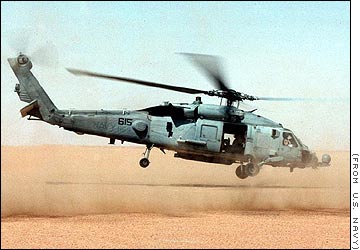
|
HH-60G
Pave Hawk
Primary function: Combat search and rescue and
military operations other than war in day, night or marginal weather
conditions
Speed: 184 mph
Armament: Two 7.62mm machine guns
Crew: Two pilots, one flight engineer and one gunner
|
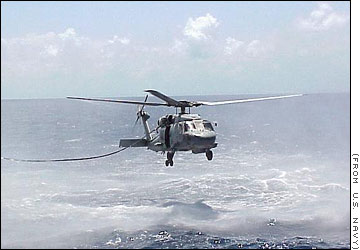 |
SH-60
Seahawk helicopters
Primary function: Antisubmarine and rescue
Speed: 207 mph maximum
Armament: Usually two 7.62mm machine guns mounted in the windows; can
also be equipped with AGM-114 Hellfire or AGM-119 Penguin missiles,
three Mk46 or Mk 50 torpedoes or additional .50-caliber machine guns
mounted in the doors
Crew: Three to four
|
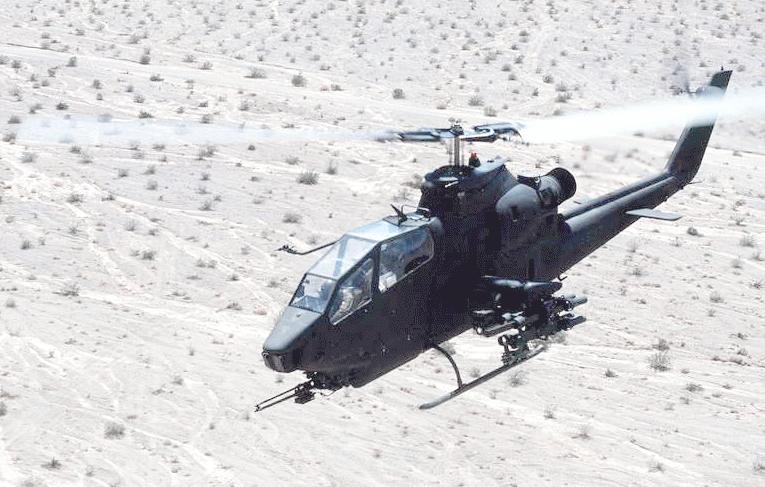
The AH-1W Super Cobra is a Marine Corps
attack helicopter capable of land- and sea-based operations. The Marine
Corps deployed 4 squadrons of 48 Cobras during Operation Desert
Storm/Desert Shield, where they destroyed 97 tanks, 104 armored
personnel carriers, 16 bunkers, and 2 antiaircraft artillery sites
without the loss of any aircraft.
Mission:
Fire support and security for forward and rear area forces, point
target/anti-armor, anti-helicopter, armed escort, supporting arms
control and coordination, point and limited area air defense from enemy
fixed-wing aircraft, armed and visual reconnaissance.
Features:
The AH-1W Super Cobra is a day/night marginal weather Marine Corps
attack helicopter that provides enroute escort for our assault
helicopters and their embarked forces. The AH-1W provides fire support
and fire support coordination to the landing force during amphibious
assaults and subsequent operations ashore.
The
AH-1W is operated in eight composite HMLA squadrons composed of 18 AH-1
and 9 UH-1 aircraft. The AH-1W is currently being outfitted with a Night
Targeting System/Forward Looking Infrared Radar that provides laser
rangefinding/designating and camera capabilities.
|
AH-1W
Super Cobra
Primary function:
Marine Corps Attack Helicopter
Speed: 169 mph
Armament: One 20mm turreted Gatling gun with 750
rounds; four external wing stations that can fire 2.75"/5.0"
rockets and a wide variety of precision guided missiles, to include
TOW/Hellfire (point target/anti-armor), Sidewinder (anti-air) Sidearm
(anti-radar).
Crew: 2 officers
Power
plant: Two General Electric T700-GE-401 engines
Thrust:
Full: 2082 shaft horsepower for 30 minutes
(transmission limited), Continuous: 1775 shaft horsepower
Length:
58 feet (17.67 meters)
Height:
13.7 feet (4.17 meters)
Rotor
Diameter: 48 feet (14.62 meters)
Maximum
takeoff weight: 14,750 pounds
Range:
256 nautical miles (294.4 miles) in basic combat attack configuration
Ceiling:
18,700 feet (5703.5 meters) in basic combat attack configuration
(limited to 10,000 feet (3050 kilometers) by oxygen requirements)
Manufacturer:
Bell Helicopter Textron
Unit
Replacement Cost: $10,700,000
Introduction
date: 1986
Inventory:
147
|
http://www.fas.org/man/dod-101/sys/ac/ah-1.htm
http://www.history.navy.mil/planes/ah1.htm
http://www.globalsecurity.org/military/systems/aircraft/ah-1w.htm
http://www.biggerhammer.net/factfile.nsf/ffiles/a251c8116905c4b98525626d00777b4b.html
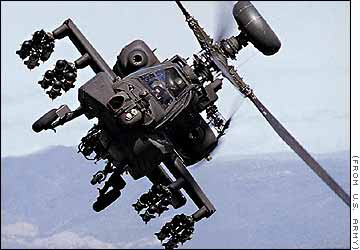
The AH-64 Apache is the U.S. Army's primary attack
helicopter, used mainly for destroying high-value targets, such as
tanks and armored vehicles. The Apache can fight close and deep, and
in a variety of conditions. There are a number of variants, from the
earliest, the AH-64A, to the latest, the AH-64D Longbow.
|
AH-64D
Apache Helicopter
Primary function: Multi-mission attack
helicopter that fights and survives the extremes of a mid-to-high
intensity battlefield and low-intensity special operations in areas
of limited conflict
Speed: 189 mph
Armament:
M230 33mm Gun; 70mm (2.75 inch) Folding-Fin Aerial Rockets; AGM-114
Hellfire anti-tank missiles; AGM-122 Sidearm anti-radar missiles;
AIM-9 Sidewinder Air-to-Air missiles.
Crew: Two in tandem:
co-pilot/gunner in front, pilot behind on elevated seat.
Power
Plant: Two General Electric T700-GE-701C turboshafts
Length:
58.17 feet (17.73 meters)
Height:
15.24 feet (4.64 meters)
Rotary
Diameter (main): 48 feet (15 meters)
Ceiling:
21,000 feet (6,400 meters)
Maximum
Takeoff Weight: 17,650 pounds
Range (combat
radius, without external fuel tanks): 300 miles
Builder:
Boeing (McDonnell Douglas) (formerly Hughes)
Unit
Cost: $14 million
Date
Deployed: (AH-64A): 1986
Inventory:
Approximately 800 in service.
|
|
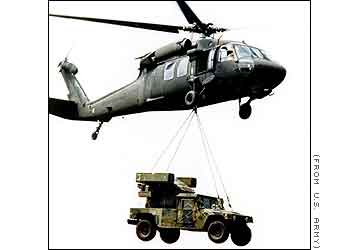
The
Black Hawk is the Army's front-line utility helicopter, used for
air assault, air cavalry, and medical evacuation missions. It is
designed to carry 11 combat-loaded, air assault troops, and can
transport a 105-mm howitzer and 30 rounds of ammunition. The
MH-60G Pave Hawk variant is operated by the Air Force Special
Operations Command for wartime infiltration, exfiltration and
resupply of special operations forces in day, night or marginal
weather conditions, as well as combat search and rescue.
The
UH-60 was made to fly soldiers into combat. It has built-in
resistance to small arms fire and most medium-caliber
high-explosive projectiles.
|
UH-60
Blackhawk Helicopter
Primary function: Air assault and general
support missions
Speed: 160 mph
Crew: Two pilots, one crew chief (one door gunner when
required)
Manufacturer:
Sikorsky Aircraft.
Length:
64 feet 10 inches (rotor turning).
Width:
53 feet 8 inches (rotor turning).
Height:
16 feet 10 inches (overall).
Weight:
11,500 pounds.
Propulsion:
Two T700-GE-701Cs. Crew: Three.
Vertical
Rate of Climb: 185 feet per minute.
Max
Range: 315 nautical miles (internal fuel).
Variants:
EH-60A electronic warfare aircraft; MH-60K Special Operations
aircraft; VH-60 executive transport helicopter; Air Force HH-60G
Pave Hawk; Navy Seahawks; Coast Guard HH-60J Jayhawk for search
and rescue.
In
Service: More than 1,500 with active duty and National Guard
troops. Used by all branches of service
|
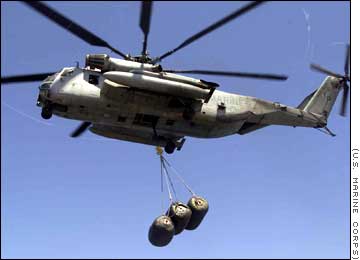 |
CH-53E
Super Stallion Helicopter
Primary function: Transportation of heavy equipment and
supplies during the ship-to-shore movement of an amphibious
assault and subsequent operations ashore.
Speed: 172.5 mph
Armament: Two XM-218 .50 caliber machine guns
Crew: Three
|
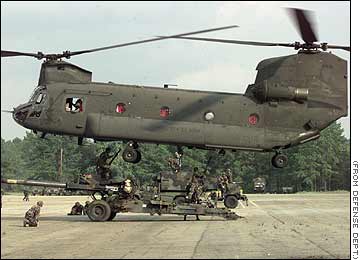
The MH-47 Chinook is a twin-turbine,
tandem-rotor, heavy-lift transport helicopter modified to support
special operations missions. The helicopter is used to move troops
and supplies on special operations missions. It has multiple
configurations.
|
Chinook
(CH-47 & MH-47)
Primary function: Designed to transport
troops, artillery, ammunition, fuel, water, supplies and equipment
on the battlefield. The MH-47 Chinook's missions include
long-range, infiltration/exfiltration of special operation forces.
Speed: Maximum airspeed 196 mph with a normal cruise speed
of 150 mph
Crew: Two, three on MH-47
Cabin
Crew: Up to 33
Power
plant: Two Textron Lycoming T55-L712 engines
Length:
51 feet
Payload:
Up to 19,100 pounds
Range:
Up to 2,000 nautical miles depending on version
Armament:
7.62mm door-mounted machine gun
Manufacturer:
Boeing.
Date
deployed: 1962
|
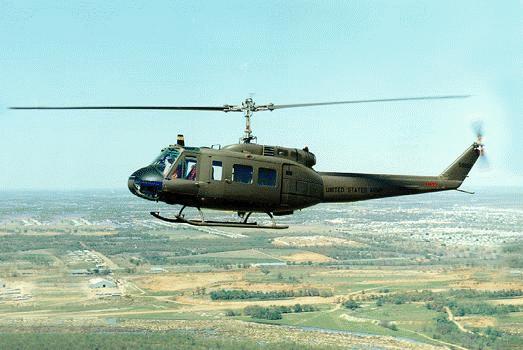
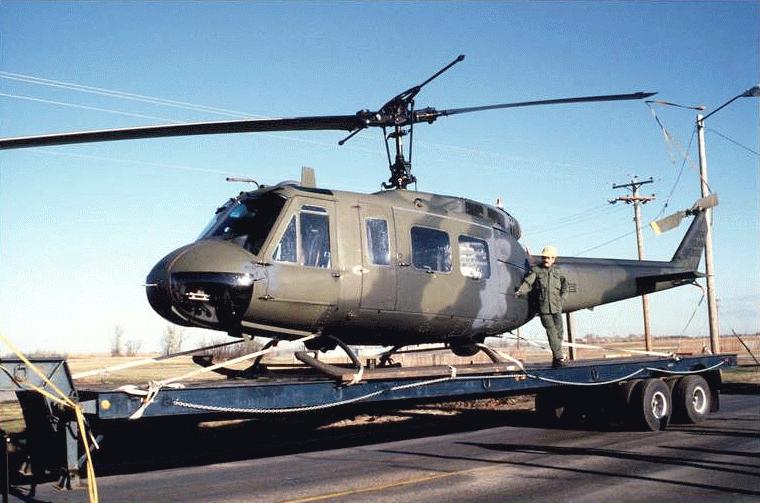
|
UH-1C
Huey Gunship Helicopter
Primary function: Utility helicopter
Speed: 139.15 mph
Crew: 4
Cabin
Crew:
Power
plant: 2 Pratt and Whitney T400-CP-400
Horsepower:
1290 burst, 1134 norm
Length:
57.3 feet
Width:
9' 5"
Height:
14.9 feet
Rotor:
48 feet
Ceiling:
14,200 feet Weight
Take-off Max: 10,500 lbs
Payload:
Range:
197.8 miles
Armament:
M-240 7.62mm machine gun or GAU-16 .50 caliber machine gun or GAU-17 7.62mm automatic gun.
The helicopter can also carry two 7-shot or 19-shot 2.75"
rocket pods.
Manufacturer:
Bell Helicopter Textron
Unit
Cost: $4,700,000 Date
deployed: 1963
Inventory:107
total, Active force, 62; Reserve, 0; ANG, 0
|
The most widely used
military helicopter, the Bell UH-1 series Iroquois, better known as the
"Huey", began arriving in Vietnam in 1963. Before the end of the
conflict, more than 5,000 of these versatile aircraft were introduced into
Southeast Asia. "Hueys" were used for MedEvac, command and control,
and air assault; to transport personnel and materiel; and as gun ships.
Considered to be the most widely used helicopter in the world, with more than
9,000 produced from the 1950s to the present, the Huey is flown today by about
40 countries.
http://www.fas.org/man/dod-101/sys/ac/uh-1.htm
http://www.americal.org/174/index.html
http://www.af.mil/news/factsheets/UH_1N_Huey.html
http://www-acala1.ria.army.mil/lc/cs/csa/aadesc.htm#UH1
http://www.helis.com/60s/h_h1.htm
http://www.biggerhammer.net/factfile.nsf/ffiles/0fcbc129ac3dd43c8525626e0049668b.html
http://ppe.navair.navy.mil/aircraft/aircraft/h1.htm
http://www.abduct.com/taylor/lt72.htm
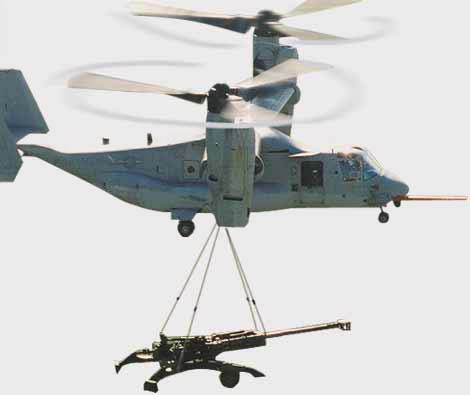
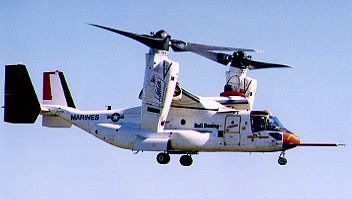
|
V-22
Osprey
Primary function:
tactical transport and combat assault aircraft
Speed: 372 mph
Crew:
G
Force: +4.0 to -1.0 G
Empty
Weight: 33,140 lbs
Vertical
takeoff (VTO): 52,870 lbs
Short
Takeoff (STO): 57,000 lbs
Self-Deploy
Takeoff: 60,500 lbs
Range:
2,500+nm
Ceiling:
26,000 ft
|
The V-22 Osprey
is a medium lift, multi-mission, vertical/short take-off and landing (V/STOL),
tilt-rotor aircraft developed by Bell Helicopter Textron and Boeing to
fill joint service combat operational requirements for the year 2001 and
beyond.
This very unique
aircraft is available in three configurations for U.S. Joint Services
Operational Requirements: the CV-22 for long-range special operations
missions for the USAF's Special Operations Command, the MV-22 for combat
assault and assault support for the U.S. Marine Corps, and the HV-22 for
combat search and rescue, special warfare, and fleet logistic support.
http://pma275.navair.navy.mil/
http://www.beyond2000.com/news/story_206.html
http://www.bellhelicopter.com/products/tiltRotor/v22
http://www.cv-22.com
return
to top












